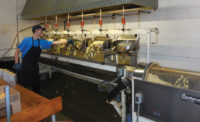It’s helpful advice. It’s Friendship. And it’s Family.
That is how candy makers and suppliers feel when they think about the last 100 years of the Retail Confectioners International (RCI).
“Beyond the help you get… you also make friends,” says Charles Flavelle, chairman of R.C. Purdy Chocolates, of Vancouver, British Columbia. “I have a lot of lifelong friends, (we) look forward to seeing them at the conventions and in different parts of the country.”
“This group feels like a family because there are so many families involved,” agrees Julia Birnn Fields, co-owner and president of Birnn Chocolates of Vermont. “We all know each other at such an intimate level …I feel like I can call more than a handful of people (if I have a question). That’s really special.”
Remembering her first function, which was in Hershey, Pa., when she was 16, she says “everything was all about chocolate” and “everyone was so welcoming.” Fields has only been in the business full-time for about seven years, but because she helped out while growing up she remembers her grandfather, Ed Birnn, being involved in the RCI. She enjoys that connection when people say to her, “I remember your grandfather. My grandfather and yours did business together.”
These long-term family relationships have endured overtime. That’s important when you are a supplier to have people vouch for your family, she says. “There’s so many family businesses in this industry which I think is unique. It seems to be the norm. We see a lot of our customers at the events and get to know their kids. People enjoy that personal touch in a world that’s so digital.”
The Candy Expo is so laid back, Fields notes compared to other trade shows, and very low key – it’s more like networking. There is also opportunity on the tour buses to interact and have personal time together.
“It’s a culture and a group of people unlike any other,” says RCI executive director Angie Burlison.
Purdy’s joined the RCI in 1964 and Flavelle, who was the association’s president 1974-75, thinks they were the first Canadian company to join. “No one was really outside their backyard,” he remembers. “I needed to see what was going on in the rest of the confectionery world.”
Although Flavelle has handed the reigns over to his daughter, Karen, he and his wife, Lucile, still make it from time to time to the conventions. But there was a time, when the association meant everything to him and his newly-purchased business.
Purdy’s just hosted the convention last September, and he says joining the RCI “was the best thing we ever did. The people in the association were very helpful.”
Back when he purchased Purdy’s some 54 years ago, the company only had four stores and the candy industry in Vancouver was competitive. “I wanted our business to grow,” Flavelle continues, noting they have 73 stores now. “I wanted to learn… the RCI was the place for that.”
He went on to say that the RCI gave his company in their formative years the tools, advice and encouragement necessary to carry out their vision. Whether you needed advice in retail, in management, or better ways to make candy, he remembers the information at these conventions and regionals as being beneficial. “We picked up so many ideas walking through plants at Anthony-Thomas,” he notes, remembering how the late Tom Zanetos and, his son, Joe (president 1993-94), shared their system for continually refreshing tempered chocolate in their enrobing bottomers.
Telling story after story, Flavelle remembers how the late Jack Sanders, of Detroit’s Sanders Candy, helped Purdy’s look “outside the box”—literally, having more than a boxed chocolates company and giving Flavelle advice on how to start an appropriate bar business for their stores.
“We all have problems from time to time –and we all share answers,” says David Jones, founder and owner of Hansel & Gretel Gourmet Candy Kitchen in Helen, Ga, with his wife, Janet. Remembering when he wanted to learn how to make a meltaway, he called four different people and all four made it a differently, which he found fascinating. And, when he saw that some of the larger candy companies’ finished product was the same as his, even though they did it differently, he says, “It was very reassuring.”
His shop is in a small Alpine-style village an hour from Atlanta where he has introduced the joys of chocolate—and this was something he learned attending RCI’s Kettle Talks and Candy Clinics. He’s learned how to solve problems and what not to do in candy making over the years and now he’s the one giving talks and writing books about candy making.
“Anytime you got together, toured companies, people would share information with you,” Jones adds. “I can’t count the things I’ve learned.”
Flavelle couldn’t agree more, saying, “I have always encouraged new members, feeling their way in their new business, to ask lots of questions of older established members who, as I said earlier are only too willing to give of their expertise. These conversations often start in the hallways and can lead to longer conversations over a glass of wine.”
If you want your company to grow, what better way than to network with others in your industry. As a supplier of more than 150 truffles, Fields says, “we all work together.” If you need boxes, she notes someone you know in the RCI can connect you. “A lot of our customers are the same because they get one product from each of us,” she says. “It’s a very personable network.”
Networking with other companies is one of the perks of being a member, according to Doug Dressman, vice president of Esther Price Candies in Dayton, Ohio. He’s been a member since 1978 and was the 2013-14 past president. “The tours, the trips, the continued advice – it’s been a great bunch of knowledge,” he adds. “It’s given us a lot of educational benefits.”
“It’s been a great organization for our company,” he continues. “We’ve all shared a lot of ideas, new techniques, pieces and trends.”
What he really has found useful is how the association’s staff makes sure its members are kept abreast of any changes in the industry.
Education was and always will be a huge component of the RCI, according to Burlison.
There has always been variations of the education methods. For instance, the RCI partnered with the Gus Pulakos Candy School in 1966 in Erie, Pa. It started out as a three-week program, dropped to two weeks and then faded over time, according to Mike Koch Sr., owner of Morley Candy Makers/Sanders Candy. Koch, who attended the school himself, says some people thought it was too expensive and difficult to spare key employees for two weeks at a time.
The next approach was to do three-day sessions on specialty courses that people could pick and choose from, he adds, including topics like how to make caramels or fondant or fudge, etc. There’s still a two-week candy school put on by the University of Wisconsin, he says, where the RCI gives their input as well as the National Confectioners Association, the Professional Manufacturing Confectioners Association and the American Association of Candy Technologists.
For 25 years, Adele Malley, who ran Malley’s Chocolates in Cleveland, Ohio, before she and her late husband, Bill, gave the company to their children, started the Malley’s School of Merchandising in 1983. The Malleys were always very involved with the RCI. Bill was president in 1976-77 and Adele, 1986-87.
“As Bill and I went around the country, I could see most of the people put the emphasis on the kitchen,” she says. “I call it the bubbling kettles. They didn’t have that same passion for the customer.” So she asked the RCI about starting a merchandising school, which they deferred to her. In the school, she showed people how to make displays and what kind of lighting was best and how retail operators should dress. Adele then had students try it themselves. Currently, she is writing a book about it.
Over the years, she also helped develop a slide program and large heavy-duty cardboard posters about chocolate to help retailers when giving tours. She also wrote a “Customer Care” audio cassette, which she gave to the industry, on how to talk to and take care of customers.
“I thought they were very important,” Malley says of the RCI. “To give people confidence. (To show members) this is how you do something. I really believe in giving people confidence. Not only to be trained in what they are doing, but why.”
It wasn’t just classes on learning how to make candy and sell it, the RCI also educated its base on the various regulations that came down the line affecting the industry. Regulations have changed over time on how nutritional labeling needs to be done, with how allergens are handled using a “contain” statement versus a “may contain” statement and now with the newest change where labels have to include “added sugar” if that applies. Each time a new regulation is even talked about, the RCI is there to educate the industry, Koch says.
Sometimes, the association is even able to prevent a change like when the Grocery Manufacturers Association and big chocolate companies wanted more flexibility with what’s allowed in chocolate, and still be called “chocolate,” says Jones. He wrote a letter to the FDA, and Gary Guittard, president and ceo of Guittard Chocolates, solicited people to sign a petition from the RCI complaining against the change. In the end they won and the standard of identity for chocolate was preserved.
Today, the RCI is more focused on keeping its members up to date on regulatory changes affecting all, on such topics as ingredient labeling, GMOs (genetically modified organism) and the Food Safety Modernization Act.
“We’ve become a much bigger company,” Koch says of Morley’s because of the RCI. Because of the association’s educational programs and contacts, “we’ve been able to grow as a company. I’ve been able to learn and keep up with all the regulatory affairs… it’s helped us grow our business.”
“I always learn something (at the conventions),” says Koch. “The tours on the conventions have been extremely valuable.”
“Each convention is unique in different cities, touring different facilities and meeting different people,” adds current President Judy Hilliard McCarthy, of Hilliards’ Chocolates. The spontaneous conversations on the bus and learning from each other is what she says makes it so great.
McCarthy says the 2010 Study Tour of Italy, led by Bernard Garbusjuk of Boehm’s Candies in Issaquah, Wash., is her fondest memory. “It was a trip of a lifetime and we had the opportunity to really get to know other members and build lifelong friendships.”
“We have many things in common, yet we do things differently,” she continues. “There’s always new ideas at these conventions and tours, she notes. “Sometime I don’t implement them right away, then I think …that applies now.”
“What I’ve enjoyed the most are the friendships I’ve made all over the world,” says Koch, who served as RCI president from 2010-11. He feels comfortable contacting those companies and asking to visit them. “Everyone is welcoming. People open their doors. Even though we’re in the same business, because we’re not all competitors, we’re willing to share.”
In addition, the RCI seems to be a generational industry. There have been several generational presidents, Fran Cox (1990-91) and Fran Cox Jr. (2008-09), of Dorothy Cox’s Candies, Fairhaven, Mass.; Chester Asher (1925) and Chester Asher Jr. (1938-39), of Asher’s Chocolates, Souderton, Pa.; and three family members from Lammes Candies.
Pam Teich, president of Lammes Candies, was a RCI president from 2000-01. Her dad, David Lamme Teich, was president in 1978-79 and her great uncle, David Lamme, served 1968-69. The 132-year-old Austin, Texas candy company known for its chewy pralines, has been involved in the RCI since the association’s inception.
“The comradery that is established amongst very similar businesses …like mine...with a family…is the most valuable thing obtained,” she says. “(It’s) people doing the same thing in a lot of the same ways, using lots of family.”
Teich remembers her first convention when she was about 15. Noting it was a little overwhelming, yet welcoming and a great time, she says the bonds and friendships formed over the years created a lot of comedy and sometimes a little drama. Growing up in that industry, she notes there’s a group of them following in their parent’s footsteps. “Our parents allowed us to grow in the business, allowing us to make the mistakes we made.”
Her family has been so involved because they believed in giving back to an organization that has done so much for them. It allows members to gain insight on issues they face every day, she says. When you have a question, “you have someone you can call you know, who you’ve met and may have had dinner or a drink with.”
Over time, she has become a little less involved but Teich says she always stays in touch with the contacts she’s made. “It’s like a second family.”
The RCI helps new companies and members with the resources they need to connect with the industry and build relationships with suppliers, according to Lacey Hesse, marketing manager for organization.
As next generations take over older companies, the RCI has started a Next Generation group for those in their 20s and 30s. “Next Gen” programs, as they’re called, encourage the younger generation to get to know each other and give them an outlet to discuss things important to their needs. “What we talk about might be different than our parents and grandparents,” notes Fields, who helps organize their social events.
New this year is the association’s logo. There was some talk of increasing the term of the presidency from one year to two, says McCarthy but the board decided to keep it the same. The board has decided to add more course offerings, but again that may take time to implement.
McCarthy, who grew up in her dad’s business (Alan Hilliard of Hillards Chocolate Systems), and worked his booth at the expo, sees the supplier and retailer side. She and her husband, Charlie, bought her dad’s store, Hilliards’ Kitch-In-Vue Candy in 1981, changed the name, and essentially have been involved in the RCI ever since.
“There’s always discussions how to make it better,” says McCarthy of the organization and its events. And, she says, the RCI is always trying to maintain its membership while attaining new ones. It has many benefits including emailing members with useful information, putting out a quarterly magazine and offering educational courses throughout the year.
“It’s important for us to get out of our little worlds, our own little communities,” she says of being involved in the RCI and going to its events. “Leave the business for part of a week and see things through fresh eyes.”














